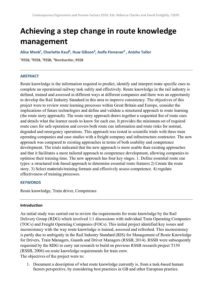| Document | Author Alice Monk, Charlotte Kaul, Huw Gibson, Aoife Finneran, Anisha Tailor |
| Abstract Route knowledge is the information required to predict, identify and interpret route specific cues to complete an operational railway task safely and effectively. Route knowledge in the rail industry is defined, trained and assessed in different ways at different companies and there was an opportunity to develop the Rail Industry Standard in this area to improve consistency. The objectives of this project were to review route learning processes within Great Britain and Europe, consider the implications of future technologies and define and validate a structured approach to route learning (the route story approach). The route story approach draws together a sequential list of route cues and details what the learner needs to know for each cue. It provides the minimum set of required route cues for safe operation and covers both route cue information and route risks for normal, degraded and emergency operations. This approach was tested in scientific trials with three train operating companies and case studies with a freight company and infrastructure contractor. The new approach was compared to existing approaches in terms of both usability and competence development. The trials indicated that the new approach is more usable than existing approaches and that it facilitates a more tailored approach to competence development, allowing companies to optimise their training time. The new approach has four key stages. 1. Define essential route cue types: a structured risk-based approach to determine essential route features 2) Create the route story. 3) Select materials/training formats and effectively assess competence. 4) regulate effectiveness of training processes. |

